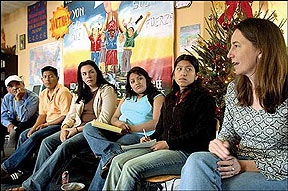From the Naples Daily News

The Coalition of Immokalee Workers, a farmworkers’ advocacy group based in Southwest Florida, has been a leader in the movement to end modern-day slavery in the United States.
Coalition leaders have taken a three-pronged approach in combating human trafficking. They’ve gotten involved in investigating and prosecuting slavery operations. They’ve trained enforcement and social service workers to ensure there are additional investigations and prosecutions – and they’ve demanded greater corporate responsibility.
“In addition to cleaning up abuses after they have already occurred, we must also prevent and eliminate the possibility of future slavery operations from taking root in agriculture,” said Laura Germino, anti-slavery campaign coordinator for the Coalition of Immokalee Workers, in a statement.
The organization has uncovered, investigated and assisted in the federal prosecution of seven slavery operations since 1997. The key to its success is its worker-based community education and outreach program, which has reached across Florida and into other East Coast states such as Georgia and the Carolinas.
The coalition’s members travel the East Coast following the harvest.
Members go from labor camp to labor camp in remote rural areas looking for problems and teaching workers about their labor rights and talking about human trafficking.
The coalition holds community meetings in Immokalee to talk about trafficking and other labor concerns. It has helped the FBI locate and interview potential trafficking victims and witnesses.
“The slavery operations that we have assisted in bringing to justice, mostly in agriculture, are multistate and can involve hundreds of workers being held against their will through the use of armed guards, informants with cell phones and coercion,” Germino said.
Contractors can threaten violence or use actual violence, such as pistol-whippings and shootings, “to ensure that workers toil for little or no pay to work off ‘debts’ for transportation, rent, food and work equipment,” she said.
To prevent human trafficking in the future, Germino said, corporate buyers must be forced to take responsibility for labor conditions in their food supply chains.
In 2005, the coalition ended its boycott of Taco Bell after its parent company, Yum! Brands, agreed to require its suppliers to pay tomato pickers a penny more a pound.
As part of the settlement, Yum! Brands has pledged to work toward improving worker conditions.
As a result of the coalition’s continuing boycott, Taco Bell has rewritten its code of conduct to say the company won’t tolerate the use of forced labor or physical intimidation of farmworkers.
“Taco Bell, as a result of the campaign, has now formally established a ‘zero tolerance’ policy against slavery,” Germino said.
The company agreed to develop and monitor codes of conduct for suppliers of Florida tomatoes.
Germino said other companies in other industries can take the same steps to discourage human trafficking by putting the same kind of pressure on their suppliers.
“Basically, industries which already have labor violations or working conditions, often called ‘sweatshop’ conditions, provide fertile soil in which slavery can take root,” she said. “In short, if you eliminate those sweatshop conditions, you will also eliminate slavery, because slavery does not exist in a vacuum.”
Human trafficking is a tough fight with no easy solutions.
But for the Coalition of Immokalee Workers and other farmworker advocates, it’s a fight they’re determined to win through education, outreach, enforcement, legal reform – and a lot of sweat.
END
